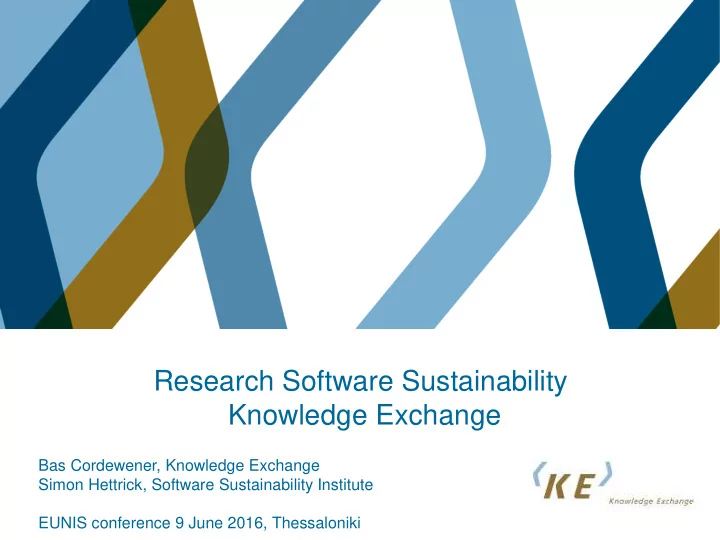

Research Software Sustainability Knowledge Exchange Bas Cordewener, Knowledge Exchange Simon Hettrick, Software Sustainability Institute EUNIS conference 9 June 2016, Thessaloniki
Without software, modern research would not be possible. Understandably, people tend to marvel at results rather than the tools used in their discovery, which means the fundamental role of software in research has been largely overlooked. But whether it is widely recognised or not, research is inexorably connected to the software that is used to generate results, and if we continue to overlook software we put at risk the reliability and reproducibility of the research itself. 2
Knowledge Exchange German Research Foundation Jisc (United Kingdom) Denmark’s Electronic Research Library SURF (Netherlands) CSC – IT Centre for Science (Finland) Five key national agencies and bodies within Europe responsible for the development of infrastructure and services to support the use ICT within education and research. 3
Knowledge Exchange – issues and reports – Petition to EC – Interoperability between Repositories and CRIS – Website OA success stories – Multi-national journal licensing pilot – Response to EC RD ambitions: a Surfboard for Riding the Wave – Collaborative Research: VREs, Tools, Data – Persistent Identifier project (URN-NBN, Handle, DOI at one table) – Guidelines for interoperable Usage Statistics for OpenAIRE – Discussion paper Open Knowledge (eco-system approach) – Authority Files (controlled vocabularies) – Author Identifier Summits (ISNI, ORCID at one table) – Value, Cost, Pricing, Sharing, Funding of Research Data (Infrastructures) – Sustainable Business models of OA services – Research Software Sustainability 4
SOFTWARE SUSTAINABILITY describes the practices, both technical and non-technical, that allow software to continue to operate as expected in the future. A constant level of effort is required to maintain the software’s operation. 5
Key recommendations 1. We must raise awareness of the fundamental role of software in research 2. Research software should be recognised as a valuable research object in line with the investment it receives and the research it makes possible 3. Funders should use their position to promote software sustainability 4. Skills related to software sustainability must be embedded in the research community 5. We must create organisations (centralised or distributed) to act as focal points for software sustainability expertise 6
The Software Sustainability Institute • A national organisation founded to help researchers build and use better software – “Better software. Better research.” • Founded in 2010 by the UK’s Engineering and Physical Sciences Research Council • Second round funding in 2015 added Biotechnology and Biological Sciences, and Economics and Social Research Councils • Work across disciplinary boundaries • Although focussed within the UK, the impact of our work is felt worldwide www.software.ac.uk 7
Software Training Helping the community to Delivering essential software develop software that meets the skills to researchers via CDTs, needs of reliable, reproducible, institutions & doctoral schools and reusable research Collecting evidence Bringing together on the community’s the right people to understand software use & sharing and address topical issues with stakeholders Community Policy
FINDINGS FROM THE REPORT 9
What issues do we face? • Benefits of software sustainability • Societal barriers • Technical barriers • Providing access to expertise • The role of funders 10
Benefits of software sustainability “If we are to gain the investment that software sustainability needs, we must show that it will lead to an overall benefit for the research community” • Trusted research • Increased rate of discovery • Increased return on investment • Research data remains readable and usable 11
Societal barriers “Improving software sustainability will require changes to the accepted practices of the research community .” • Lack of awareness of software’s role in research • Lack of identification and citing of software • Lack of understanding of licensing and ownership • Lack of clear incentives and impact • Lack of software skills • Lack of career path for software experts • Gender balance 12
Technical barriers There are fewer concerns about technical barriers to software sustainability than social barriers. However, this does not mean that overcoming technical barriers will be easy. • Identifying “good” software • Software discovery 13
Providing access to expertise “to improve the research community’s use of software, there must be an organisation (or organisations) that promote software sustainability and provide access to expertise” • In the UK: centralised approach via the Software Sustainability Institute • In Netherlands: expertise distributed over DANS and SURFsara • Each country will choose it’s own national approach • How do we build capacity over Europe? 14
The role of funders “Funders look to support reliable, trusted research which is also the goal of software sustainability.” • Change novelty requirements • Funding for maintenance – not just creation • Software Management Plans 15
Back to key recommendations 1. We must raise awareness of the fundamental role of software in research 2. Research software should be recognised as a valuable research object in line with the investment it receives and the research it makes possible 3. Funders should use their position to promote software sustainability 4. Skills related to software sustainability must be embedded in the research community 5. We must create organisations (centralised or distributed) to act as focal points for software sustainability expertise 16
The latest developments • European software sustainability forum with national nodes • Seal of Approval for Sustainable Research Software • Initiative by DANS and E-Science Center (NL), SSI-UK, and Knowledge Exchange • Support and interest by CSC (Finland), CNRS (France) and several German Research & IT institutions • Workshop planned for 27 October 2016 in The Hague (limited 60 places, pre-register your interest. 17
Questions are very welcome! Find the full report at: More information: http://goo.gl/C1iDcN www.knowledge-exchange.info s.james@jisc.ac.uk Continue the conversation: Bas.Cordewener@jisc.ac.uk
Recommend
More recommend